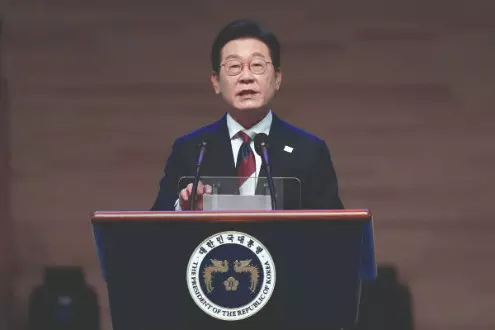S Korea must navigate ‘Trump risk’ at key summits in Japan, US

Seoul: South Korea’s President Lee Jae Myung faces a pivotal foreign policy test barely two months after taking office, with back-to-back summits in Tokyo and Washington that reflect the wider struggle of US allies to navigate Donald Trump’s unilateral push to redefine postwar orders on trade, security and alliances.
The meetings come after Seoul and Tokyo reached trade deals with Washington that spared them from the Trump administration’s highest tariffs, but only after pledging hundreds of billions of dollars in new US investments.
Trump’s transactional approach with long-standing allies extends beyond trade to security and has fuelled fears in South Korea that he will demand higher payments to support the US troop presence in the country, even as he possibly seeks to scale back America’s military footprint there to focus on China.
The looming concerns about a US retreat in leadership and security commitments come as South Korea and Japan confront growing cooperation between their nuclear-armed adversaries, North Korea and Russia, partners in the war in Ukraine and in efforts to break isolation and evade sanctions.
Here is what is at stake for the Asian allies of the US as they deal with an America-first president who’s more unyielding than his predecessors:
A day after confirming his August 25 summit with Trump, Lee’s office announced he will visit Japan on August 23-24 to meet Prime Minister Shigeru Ishiba, a rare diplomatic setup that underscores how Trump is drawing closer two often-feuding neighbours with deep-rooted historical grievances.
The meeting on Saturday in Tokyo of Lee and Ishiba — who last met on the sidelines of the Group of Seven summit in June — is largely
about projecting leverage as the countries seek to coordinate their response to Trump, said Choi Eunmi, an analyst at South Korea’s Asan Institute for Policy Studies.
“There is now the Trump risk,” Choi said. “There’s especially a lot of uncertainty in the business sector, so they might discuss ways to ease that uncertainty … not necessarily in joint efforts to confront Trump, but within the framework of trilateral cooperation.”
Yukiko Fukagawa, a professor at Japan’s Waseda University, said Lee’s visit to Tokyo will also be seen positively in Washington, long frustrated by its Asian
allies’ persistent disputes over Japan’s colonial rule of Korea before the end of World War II, and the way these tensions hindered three-way security collaborations.
“Because they have to deal with increasingly challenging mutual counterparts, such as China and America, both Japan and South Korea are under pressure to set aside minor differences to cooperate on larger objectives,” Fukagawa said.
Yoshimasa Hayash, Japan’s chief cabinet secretary, said Lee’s visit will help promote the “stable development” of bilateral ties as their countries work together on international challenges by utilising the “shuttle diplomacy” of regular summits.
Lee and Ishiba could discuss restarting long-stalled free trade talks and
South Korea’s potential entry into the Comprehensive and Progressive Agreement for Trans-Pacific Partnership, or CPTPP, a 12-member Asia-Pacific trade pact that Ishiba has pushed to expand amid tensions over US tariffs.
Ishiba at the White House in February and at the G7 in Canada.Agencies



